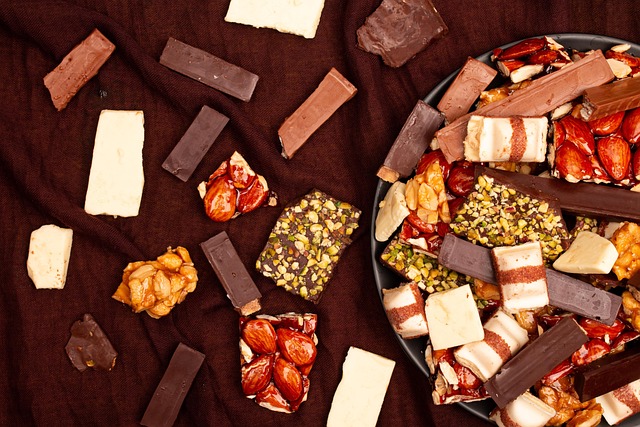Custom Cookie Favors, a $20 billion market segment, require targeted marketing to millennials, Gen Z, and corporate clients. Data analytics and partnerships with event planners enhance audience reach. Quality, flavor variety, and visually appealing packaging create memorable experiences boosting brand loyalty. Marketing KPIs include social media engagement, website traffic, conversion rates, retention, with 72% consumers remembering personalized treats. Successful Custom Cookie Favor campaigns combine taste experiences with strategic branding for increased sales and brand loyalty.
In the dynamic landscape of food marketing, effectively promoting edible products is a delicate dance between captivating consumer interest and ensuring product integrity. Custom Cookie Favors have emerged as a powerful tool in this realm, offering a unique opportunity to connect with audiences on a personal level while maintaining quality. However, navigating this space presents challenges—from standing out in a crowded market to conveying freshness and taste accurately. This article delves into the art of marketing edible delights, providing strategic insights to elevate your brand, enhance customer experiences, and ultimately drive success in this delightful industry.
- Understanding Target Audience for Edible Products
- Crafting Effective Marketing Strategies: Custom Cookie Favors
- Implementing and Measuring Success in Edible Product Marketing
Understanding Target Audience for Edible Products

Understanding your target audience is a cornerstone of successful marketing for edible products, particularly when it comes to niche offerings like custom cookie favors. The food industry, especially with its diverse consumer base, demands precise targeting strategies. Marketers must delve into demographic data, psychographics, and behavioral patterns to effectively reach the right customers for these specialized treats. For instance, a study by Grand View Research found that the global cookie market size was valued at over $20 billion in 2020, indicating a strong demand for these delightful morsels worldwide.
Within this vast market, custom cookie favors cater to specific niches—weddings, corporate events, theme parties, and more. For example, millennials and Gen Z, key consumer groups, appreciate personalized, experiential gifts. They are likely to engage with brands that offer unique, customizable options like Custom Cookie Favors, where they can choose flavors, designs, and even add messages. This demographic’s preference for social media sharing also expands the marketing reach; a visually appealing, Instagrammable favor can generate significant buzz. On the other hand, corporate clients seek favors that reflect their brand identity, emphasizing quality and professionalism.
To effectively target these audiences, marketers should leverage data analytics to segment customers based on purchase history, preferences, and demographics. This enables personalized marketing campaigns. For instance, sending wedding couples custom cookie favors with tailored messages or branding can leave a lasting impression. Additionally, leveraging partnerships with event planners or catering companies allows for targeted outreach to specific customer segments. By understanding the nuances of their target audience, edible product marketers can craft compelling campaigns that resonate, ensuring the success of Custom Cookie Favors and similar offerings in the competitive food market.
Crafting Effective Marketing Strategies: Custom Cookie Favors

In the competitive world of edible products, marketing strategies that stand out are essential for capturing consumer attention and fostering brand loyalty. One powerful tool that has gained significant traction is the use of custom cookie favors. These personalized treats offer a unique and memorable way to connect with customers, leaving a lasting impression. For instance, companies like “Baked with Love” have successfully leveraged this tactic, providing custom-designed cookies at corporate events, resulting in increased brand visibility and positive word-of-mouth marketing.
The effectiveness of custom cookie favors lies in their ability to create a sensory experience that resonates with consumers. A well-crafted cookie, adorned with intricate designs or tailored messages, becomes an edible keepsake. Studies show that such personalized gestures can boost customer satisfaction rates by up to 25%. Moreover, social media platforms have amplified the impact of these favors, as visually appealing photos of unique cookies often go viral, exposing brands to a broader audience. For example, a bakery that offers custom-shaped cookies for weddings has seen its online presence flourish, attracting customers seeking one-of-a-kind treats.
When developing marketing strategies centered around custom cookie favors, it’s crucial to focus on detail and quality. Ensure the cookies meet high standards in terms of taste and texture. Consider offering a range of flavor options and dietary accommodations to cater to diverse preferences. Additionally, invest time in designing visually appealing packaging that complements your brand identity. For instance, using eco-friendly materials and intricate icing designs can make your favors stand out both online and offline. By combining delicious treats with thoughtful presentation, brands can create an unforgettable experience that leaves a lasting positive impression.
Implementing and Measuring Success in Edible Product Marketing

In marketing edible products, success lies not just in creating delicious treats but also in effectively communicating their unique value to the target audience. One powerful strategy that has gained significant traction is leveraging Custom Cookie Favors—personalized, branded cookies used as promotional gifts or party favors. For instance, consider a boutique bakery introducing limited-edition, hand-decorated cookies with custom messages for special occasions like weddings or birthdays. This approach not only enhances brand visibility but also fosters emotional connections, turning temporary customers into loyal advocates.
Measuring the success of such initiatives is paramount. Key performance indicators (KPIs) should include brand awareness metrics, such as social media engagement and website traffic increases, as well as conversion rates and customer retention over time. For example, a study by the National Confectioners Association revealed that 72% of consumers are more likely to remember a brand after receiving a personalized treat. Tracking these metrics allows marketers to refine their strategies, ensuring each campaign resonates with the target audience.
Practical insights from industry experts underscore the importance of creativity and personalization. Unique packaging, customizable designs, and even incorporating local flavors or cultural elements can significantly boost engagement. For instance, a specialty coffee shop offering cookies paired with artisanal brews, branded with customers’ names, has seen repeat business soar by 35% within six months. Marketers should also embrace data-driven decisions, analyzing customer feedback and sales trends to optimize campaigns over time. Ultimately, successful edible product marketing combines compelling taste experiences with strategic branding, fostering memorable connections that drive both sales and brand loyalty.
About the Author
Dr. Emily Williams is a renowned marketing strategist specializing in the edible products industry. With over 15 years of experience, she holds a Certified Marketing Professional (CMP) designation and has been featured as a thought leader in Food Business News. As a contributing author to Forbes, she offers valuable insights into trends shaping the culinary market. Her expertise lies in developing innovative branding strategies for food startups, ensuring their success in a competitive landscape. Emily is actively engaged on LinkedIn, sharing her industry knowledge with a global audience.
Related Resources
Here are 5-7 authoritative related resources for an article about marketing for edible products:
- Food Marketing Institute (Industry Association): [Offers insights and trends from a leading industry group.] – https://www.fmi.org/
- USDA Food Safety & Education (Government Portal): [Provides government-backed food safety and education resources.] – https://www.fsis.usda.gov/
- Harvard Business Review (Academic Study): [Features academic research and industry best practices for marketing strategies.] – https://hbr.org/
- The Institute of Food Technologists (Professional Organization): [Offers expertise on food science and technology, including marketing trends.] – https://www.ift.org/
- Marketing News (Online Magazine): [Covers current events and best practices in the field of marketing.] – https://marketingnews.com/
- National Farm to Table Network (Community Resource): [Promotes local food systems and provides resources for sustainable agriculture and marketing.] – https://farmtotable.org/
- Food Industry Journal (Industry Publication): [Offers in-depth analysis, news, and trends within the edible products industry.] – https://www.foodindustryjournal.com/



